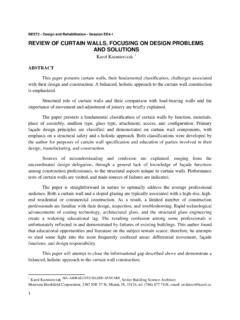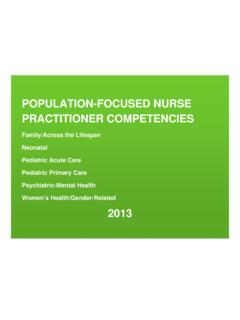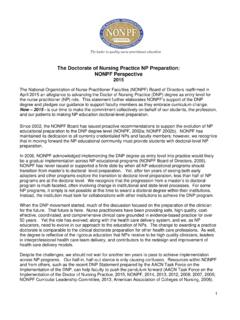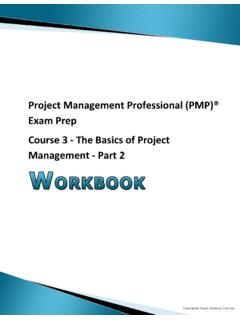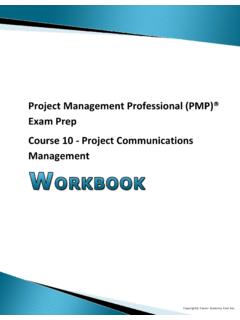Transcription of Assessing the Effectiveness of Project Management ...
1 Paper presented at African Rhythm Project Management Conference 22 24 April 2002, Johannesburg, South Africa Hosted by: Project Management Institute of South Africa (PMISA): ISBN Number: 0-620-28853-1 Assessing THE Effectiveness OF Project Management PRACTICES IN Project -DRIVEN ORGANISATIONS Michael Smith Centre for Learning, telkom SA Main Road, Walmer, Port Elizabeth, RSA Email: 1. INTRODUCTION This research paper is presented with the aim of promoting best practice in Project Management and its application. The assessment tool, developed as part of this research to evaluate the Effectiveness of Project Management practices, can also be utilised or adapted by other organisations and industries to determine their Project Management competence. The information presented in this document deals with the following issues: Role of Project Management in modern organisations Overview of the study Summary of the research results Recommendations based on the research results 2.
2 ROLE OF Project Management IN MODERN ORGANISATIONS In order to expand on the significance of this research it is necessary to clarify the role of Project Management in organisations. The questions that need to be addressed to place the role of Project Management in perspective are: What is the significance of Project Management ? What is the value of Project Management ? What is the future of Project Management ? Significance of Project Management The long-term survival of any organisation is to a certain extent dependent on Management s ability to develop and implement corporate strategies in harmony with its ever-changing environments (1). Furthermore, it is stated that the strategic alignment between an organisation and its environment is usually effected through projects such as investments, new products, internal re-organisation, etcetera.
3 The escalating resource constraints faced by organisations require the implementation of Project Management methods that will maximise the proportion of successful projects. In an increasingly competitive and volatile environment, projects are of growing strategic importance to the survival of any organisation for the following reasons: (i) The timing and successful implementation of projects can greatly enhance an organisation s competitive situation. For example, the reduction of the time required to bring a new product to the market can contribute to the erection to prevent barriers to entry for competitors. This in the end determines the overall profitability of the Project . Time and, in particular, speed of execution is increasingly considered a strategic factor that needs to be managed as any other resource.
4 (ii) Projects consume an organisation s resources such as cash flow, people and equipment. Projects only produce a return on investment when successfully implemented, therefore, the goal of any Project Management system is to transfer projects into stable operations that will eventually generate liquidity. That means, to realise profitability, the capital invested needs to be recovered first. (iii) Projects normally involve significant changes to the infrastructure (and culture) of an organisation. Projects often require the destabilisation of the existing order when they necessitate the re-engineering and restructuring of the internal workings of the organisation. Projects are thus a source of deviation that create tension and provoke the need for change. The need for Project -based Management is generally derived from one or several key business drivers, that is, those elements of the business so fundamental, that they often determine a business' level of competitiveness and success (2).
5 The business drivers identified are: Reduced product development time Extended product range Increased use of multi-functional teams and partnerships Creation of global service centers from cross-functional teams Increased importance of controlling individual activity Multi-national approach to development Standardisation of information technology Rapid restructuring of industry sectors through acquisition and joint-ventures Restricted government spending Management of external resources and contractors Ease of access to information and knowledge Modern Project Management is a fully-integrated part of its host organisation that works across functional lines, business units and geographic regions (3). Today's businesses do not rely on one strategic Project , but several parallel initiatives that must combine to meet business objectives.
6 This statement is substantiated on the following grounds (4): (i) With decentralised and global work forces, projects must co-ordinate the efforts of multiple cross-functional teams operating in different environments and geographic locations. (ii) Project information needs to be shared and presented to an increasing number of stakeholders, including senior Management , clients, suppliers, partners and controlling bodies, whose impact can threaten or strengthen the Project outcomes. (iii) In a dynamic environment traditional business models do not succeed, whereas Project -based organisations thrive. With faster response to market demand, better utilisation of resources and improved Project control and performance, Project -based organisations have the ability to maximise their investments in core business projects and leverage evolving technology.
7 From the benefits that have been identified, it is evident that Project Management is of particular importance to modern organisations, especially if the demand to do more with less is considered to provide a competitive edge. Value of Project Management According to Meredith and Mantel (5), actual experience with Project Management indicates that the majority of the organisations using it experience better control and better customer relations. Other advantages include lower costs, higher quality and reliability, higher profit margins, a sharper orientation towards results, improved interdepartmental co-ordination and higher employee morale. Other benefits identified by Kerzner (6) are: improved efficiency and increased profitability through better utilisation of limited resources; and enhanced planning, estimating and cost control leading to a more consistent achievement of milestones and objectives.
8 The Project Management Institute (7) further confirms that Project Management helps organisations meet their customers needs by standardising routine tasks and reducing the number of tasks that could potentially be forgotten. Project Management thus ensures that available resources are used in the most effective and efficient manner. Project Management also provides senior executives with insight into what is happening and where things are going within their organisation. The application of Project Management principles enables senior executives to: establish measures of success. enable customer focus and alignment. quantify value commensurate with cost. optimise the use of organisational resources. incorporate quality principles. put strategic plans into practice. ensure fast time-to-market (for example new products or services).
9 Furthermore, it is stated that Project Management has gained popularity because of significant changes in the workplace. Some of these changes include: Downsizing (fewer people to do more tasks) Projects and services have grown larger and more complex Fierce global competition Easier access to information through vast communications networks More sophisticated customers demanding higher quality goods and services Exponential technological growth Multinational organisations seeking to establish uniform practices for managing projects According to Pennypacker (8), implementing Project Management adds significant value to organisations . This conclusion is based on the results of a survey of more than 100 senior-level Project Management practitioners across various organisations and industries. More than 94 percent of the respondents stated that implementing Project Management added value to their organisations.
10 Organisations cited significant improvements in financial measures, customer measures, Project /process measures and learning and growth measures. Organisations of all sizes and in all industries reported improvement. The companies surveyed noted average improvements in the order of 50 percent in Project execution, 54 percent in financial performance, 36 percent in customer satisfaction and 30 percent in employee satisfaction. Based on these results as well as the benefits identified by the respective authors, it can be concluded that those organisations that do not implement Project Management will be at a competitive disadvantage to those who do. The future of Project Management Project environment has always been a challenge, but never so much as at the current time (9).
